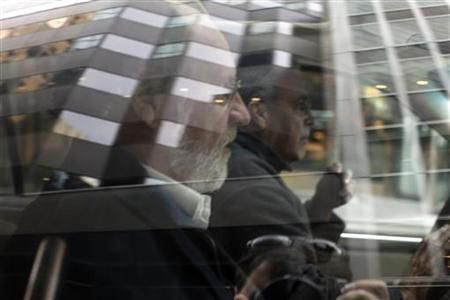Corzine's Fall From Grace Leaves Obama With Even Less Bridges to Wall Street
ANALYSIS

The collapse of New York trading platform operator and investment firm MF Global, which filed for bankruptcy Monday amid a crisis of confidence, is being examined with a certain degree of schadenfreude as an indictment on chief executive Jon S. Corzine.
Corzine, a former Goldman Sachs CEO who took a sabbatical from Wall Street to get involved in national politics (and served as governor of New Jersey) might be facing more real indictments: while the forensic accounting is far from over, it seems several hundred million dollars in consumer money are missing, as MF Global was (likely illegally) borrowing those funds to plug holes in the firm’s proprietary trading unit’s cash flow.
The fall of Corzine, a prominent figure with a toehold in the worlds of both finance and politics, is not only an issue for himself, but for one of the men who has sought his advice and support on a regular basis, President Barack Obama. Perhaps more importantly, it follows a trend that has dogged the president since 2010, as, due to a variety of causes, many of the people on Wall Street he had previously being close to have later found themselves uninvited to tea in the Rose Garden.
The Obama/Corzine Link
It is hard to overstate the link between Obama and Corzine. Corzine was Obama’s top Wall Street fundraiser, most recently offering his home to host a $35,800-a-head affair that banked the president half a million dollars for his re-election bid. According to various media outlets, he was also at the head of efforts by the president to coddle many Wall Street executives that had taken offense to his harsh rhetoric against Wall Street “fat cats” from early 2010. The relationship was as old as it was strong. Back in 2008, then-Senator Barack Obama had referred to Corzine as “our Wall Street guy.”
And it wasn’t just because of the money. Corzine was esteemed by Obama as someone who did not “tell people what they want to hear instead of what they need to hear,” as the president himself put it during a speech in support of Corzine’s 2009 bid for another gubernatorial term. Corzine had dinner at the White House many times, and was considered a front-runner to replace Timothy Geithner as Treasury Secretary after 2012 (That possibility was so obviously latent that a clause in MF Global’s bonds up to August promised to reward investors with higher interest payments if Corzine left the firm for any government job.)
Now Corzine is persona non grata in the West Wing, under scrutiny by the FBI.
It is hardly the first Wall Street inside man that is no longer welcome to a power lunch with the leader of the free world. Jamie Dimon, the CEO of JP Morgan Chase (once labeled by Time Magazine as “Obama’s Favorite Banker”) suffered a very public purging from Obama’s inner circle during 2010. He repaid the public embarrassment by publicly giving money to Mitt Romney this year.
The man many saw as replacing Dimon as Obama’s bank CEO confidante, Brian Moynihan of Bank of America, seems to still retain his loyalty to the man in the Oval Office, but might suffer a similar indignity to Dimon. Obama, joining a chorus of politicians, recently criticized his bank when it introduced a $5 monthly fee for debit card use.
Larry Summers Critiques Term One
Of course, there’s the case of former Director of the National Economic Council, now-Harvard Professor Larry Summers, who left the administration earlier this year, reportedly disappointed he had not been appointed as the new Federal Reserve Chairman. Summers, who runs in the worlds of politics, finance and academia, had not been too noisy earlier in the year. The past month, however, has seen him participate in various activities which will likely mean he is off the White House Christmas card list.
First, there was an editorial in the Financial Times that was obliquely critical of Obama’s housing policy, stating how “unfortunately past policy has been preoccupied with backward-looking attempts to address the consequences of errors in mortgage extension by addressing homeowners on a case by case basis.” Then there were comments to Yahoo! News where he dared utter the verboten phrase “douple-dip recession.” Finally, there was his participation in a panel hosted by The Economist where, alongside a group of other policy and industry titans, he simulated how the government would likely respond to a crisis under the new Dodd-Frank framework. The panel's assessment: the new safeguards are worthless.
This all follows a media firestorm over how he was characterized in a new book about the first years of the Obama administration (Ron Suskind’s “Confidence Men,” out in September). According to the book, Summers was highly disrespectful of the president while he was still in his employ, more than once commenting to various high-level advisers that he felt like, during the 2009 response to the financial crisis, there was “no adult in charge.”
It’s hard to estimate how much Obama loses every time a bridge to Wall Street goes up in flames. While not having direct contact with the lions of finance means the president is less able to obtain specialized knowledge regarding what is going on with the economy, being too cozy with them costs him politically. Many will even applaud any distancing between the administration and the New York banking circuit, noting bankers have an infallible track record of using the president's ear to put their interests over those of the country.
And it's not like Obama is totally unplugged. Robert Wolf, a UBS executive, is a golf buddy. William Daley was picked off his job at JP Morgan to be Obama’s chief of staff.
Whatever the outcome for Obama on this one, it's still bound to be better than the one faced by MF Global's shareholders.
© Copyright IBTimes 2024. All rights reserved.





















